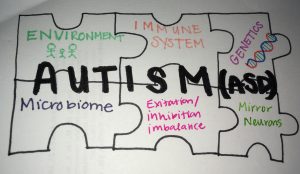
Autism Spectrum Disorder (ASD) is an extremely complicated and diverse disorder that presents itself in various ways. This disorder is somehow different in almost every single case, which is why the spectrum is useful in classifying the severity of the disorder. Unlike other diseases and disorders, Autism is not caused by one specific gene mutation or condition that leads to the development of the disorder. It is a combination of a variety of genetic and environmental factors that contribute in various ways to how the disorder is presented in those affected.
The two main themes found in most ASD cases are immune system abnormalities and a Zinc deficiency. Zinc is vital to the development and operation of a functional immune system. Many important enzymes and proteins in the immune system, and found at the excitatory synapses require zinc to function properly. Astrocytes are star-shaped glial cells that promote the recycling and re-uptake of neurotransmitters. They maintain a balance of excitation and inhibition signals in the brain. In patients with ASD, the GABA pathway was found to be one of the most affected pathways. Patients were found to have significantly decreased levels of GABA, an inhibitory neurotransmitter. When these levels are too low, there is not enough inhibitory signaling happening which leads to the overstimulation due to more excitatory signaling occurring. This could be linked to the symptoms experienced by people with ASD being overstimulated by their environment and not knowing how to process and appropriately respond to that stimulus.
In addition to this factor of the imbalance of excitation and inhibition signaling, there are many other factors that could possibly contribute to the development to Autism as well. One of these is the lack of pruning of unnecessary neurons which is called autophagy. In healthy brains, autophagy happens as the brain is developing, degrading the unneeded neurons while new ones develop. However, when this process does not go as it should, it leads to excess neurons which can also be a cause in the symptoms experienced in ASD.
Another common factor in patients with ASD is gastro-intestinal symptoms. The autistic brains were found to be correlated with a less diverse gut microbiome, specifically lacking carbohydrate and fermenting bacteria. It has also been shown that children who are born via C-section and who do not breastfeed are much more susceptible to a microbiota imbalance. In addition to this imbalance of microbiota, an increased permeability in the intestines is found to be common in individuals with ASD. This can be caused by a variety of factors including poor diet, chronic stress or bacterial imbalance. This condition allows unwanted macromolecules and bacteria to escape from the gut into the bloodstream and have the ability to cross the blood brain barrier which could contribute to the development of autism.
Autism is not a disorder with a single cause or treatment. Therefore, it is challenging to find the root of the problem occurring in the brain as each case is unique. It is a puzzle with many parts that come together to present the symptoms in an individual. These puzzle pieces can be any number of environmental and genetic factors that include and go beyond the factors previously mentioned. Autism Spectrum Disorder is extremely unique and difficult to research due to this aspect of the disorder. The spectrum can also be thought to include everyone. We are all on the spectrum somewhere, but the severity varies significantly depending on the symptoms that an individual displays. Each piece of the Autism puzzle comes together uniquely, and there is continuing research trying to solve more and more of this extremely complicated puzzle in the brains of people with ASD.